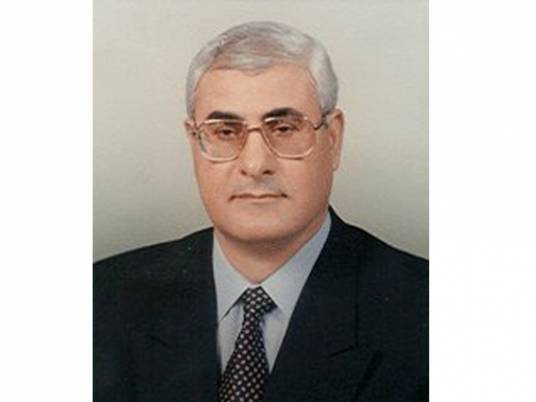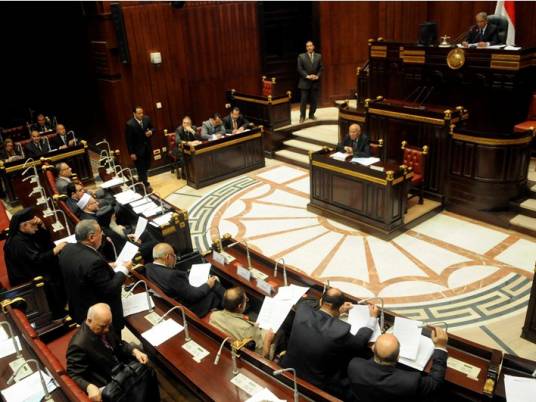
Egypt’s Interim President Adly Mansour has issued a decree on Sunday to form the 50-member committee tasked with writing a final draft of Egypt’s amended constitution before putting it up for referendum in two months.
The committee will include all sectors of society except Muslim Brotherhood representatives who are under crackdown from security forces. Both Al-Azhar and Salafist Nour Party will be represented from the Islamist side, while the Coptic Church will have three members.
The decree has come after 10-member expert committee introduced several changes to the 2012 constitution and passed the draft to Mansour. In general, the draft constitution serves more the goals of 30 June uprising rather than 25th January.
The new draft banned the formation of political parties based on religion which will pave the way for adopting Mubarak policy aimed at excluding Islamists from political process, especially after 30 June uprising that deposed Islamist president Mohamed Morsy.
While exclusion is applied on Islamists, feloul (remnants of Mubarak regime) will be allowed to return back into the political scene.
The 50-member committee has said it prefers canceling three contingent articles: the interpretation of the principles of Islamic Sharia, the cancellation of the Shura Council and the 50 percent quota allocated to workers and farmers in parliament.
Article 219 which defines the principles of Islamic Sharia was taken out. The part stating that soliciting the opinion of Al-Azhar Senior Scholars is obligatory in matters pertaining to Islamic law was also removed as well as the article stating that the “state shall ensure sufficient funds for Al-Azhar to achieve its objectives.”
Article 2 of the previous constitution stating that Islam is the state’s religion, and Arabic is its official language, was kept, but Article 219, which explains it in detail was removed.
The controversial clause 219 from the 2012 constitution stated that the principles of Islamic Sharia included general evidence, the foundational principles of Islamic jurisprudence and the reliable sources from among the Sunni schools of thought.
A clause which gave the president full authority to pardon prisoners was restricted in the new draft constitution by requiring the consent of the cabinet.
The deposed president Morsy was widely slammed for pardoning Jihadi Islamists who are escalating their armed operations against the army in Sinai.
Despite the secular flavor of the charter but both secular and Islamist powers have reservations on the first draft of the new constitution.
The only Salafi trend (Nour) in the 50-member committee is likely to defend the Islamic-flavored articles in the dissolved constitution, especially clauses that protect Egypt's Islamic identity.
From the other side, secular and Christian representatives will work from one hand giving more space for freedom and from the other side curbing the Salafi interpretation in Islamic Sharia.
“We all agree on Islamic Sharia as a source of legislation, but without confusing me with old jurisprudence interpretations which might not be coping with the modern age, we should add (as long as these articles does not violate with the international charters signed by Egypt concerning human rights, citizenships for all citizens) such articles if left could make fitna (sedition) in the country,” said Archbishop Abdul Masseh Baset.
Apart from the Islamic Sharia clauses, Abdul Masseh Baset view that the tem experts made mistakes due to their inefficiency, expecting that Nour would withdraw from the 50-member committee as “their participation is based on ideological goals not nationalist ones.”
While Islamists dominated the 100-member constituent assembly that drafted Egypt’s 2012 constitution when Morsi was in power, the 50-member committee will be dominated by secularists.
Below is the 50 members of the committee assigned to finalize the 2013 constitution:
1. Pastor Safwat al-Bayadi, head of the Evangelical Church.
2. Mohamed Abdel Aziz of Tamarod.
3. Ahmed Eid of the Revolutionary Youth Coalition.
4. Mahmoud Badr of Tamarod.
5. Amr Salah of the Revolutionary Youth Coalition’s 30 June Front.
6. Author Mohamed Salmawy of the Writers Union.
7. Filmmaker Khaled Youssef of the Arts Unions.
8. Artist Mohamed Abla of the Fine Arts Sector.
9. Poet Sayed Hegab of the Supreme Council of Culture.
10. Gebaly Mohamed al-Maraghy of the Egypt Workers Union.
11. Ahmed Khairy, head of the National Union of Egyptian Workers.
12. Ahmed Abdel Qader, head of the Farmers Syndicate.
13. Mamdouh Hamada, head of the Agricultural Cooperative Federation.
14. Sameh Ashour, head of the Lawyers Syndicate.
15. Khairy Abdel Dayem, head of the Doctors Syndicate.
16. Mohamed Shawky, head of the Engineers Syndicate.
17. Diaa Rashwan, head of the Journalists Syndicate.
18. Elhamy al-Zayat, head of the Federation of Chambers of Tourism.
19. Abla Mohhi Eddin, adviser to the Ministry of Industry.
20. Ahmed al-Wakil of the Federation of Chambers of Commerce.
21. Mohamed Badran, president of Egypt Students Union.
22. Talaat Abdel Qawi of the National Institutions and NGOs.
23. Mervat al-Talawy of the National Council for Women.
24. Dr. Aza al-Ashmawy of the Motherhood Council.
25. Mona Zulfuqar of the National Council for Human rights.
26. Mossad Abu Fagr, an activist from Sinai.
27. Dr. Mohamed Ghoneim, a public figure.
28. Dr. Magdi Yacoub, a public figure.
29. Amr Moussa, a public figure.
30. Amr El-Shobaky, a public figure.
31. Gaber Nassar, president of Cairo University.
32. Saad Eddin al-Hilaly, a public figure.
33. Dr. Hoda al-Sadda, a public figure.
34. Al-Sayed al-Badawy of the liberal current.
35. Mohamed Abul Ghar of the liberal current.
36. General Mohamed Magd Eddin Barakat of the armed forces.
37. Bishop of Tanta Paul from the Orthodox Church.
38. Grand Mufti Shawki Allam representing the Al-Azhar.
39. Mohamed Mohamedein of the Supreme Council of Universities.
40. Bassem al-Zarqa, representing the Islamist current.
41- Kamal al-Halabawy, representing the Islamist current.
42. Hossam Eddin al-Massah, representing the Union of Special Needs.
43. General Ali Mohamed Abdel Mawla of the police.
44. Bishop Anthony, representing Coptic Catholics.
45. Haggag Adoul, representing Nubians.
46. Mohamed Samy, head of the Al-Karama Party.
47. Abdallah al-Naggar, representing the Al-Azhar.
48. Mohamed Abdel Salam, representing the Al-Azhar.
49. Hussein Abdel Razeq of the leftist Tagammu Party.
50. Dr. Abdel Gelil Mostafa, a public figure.

